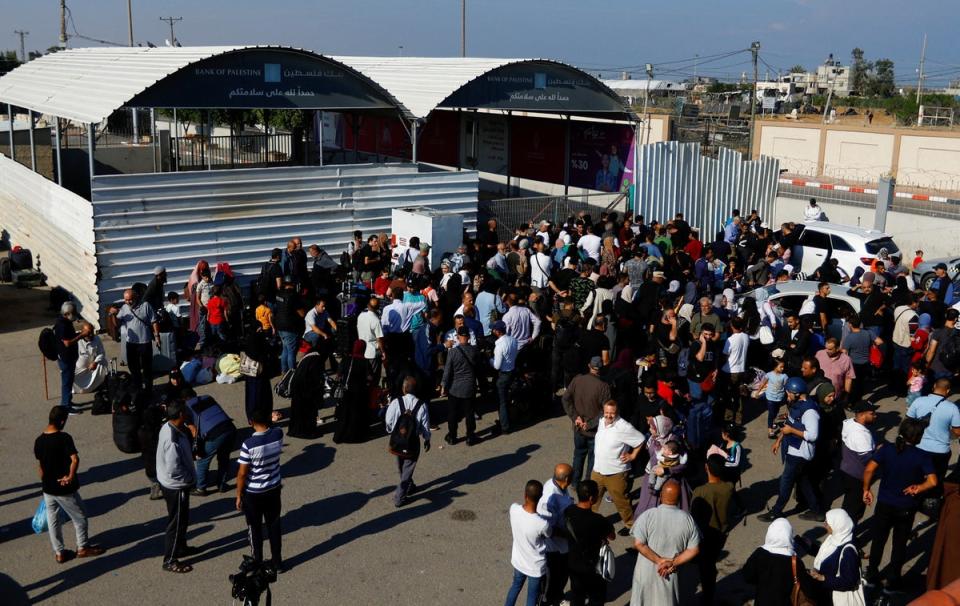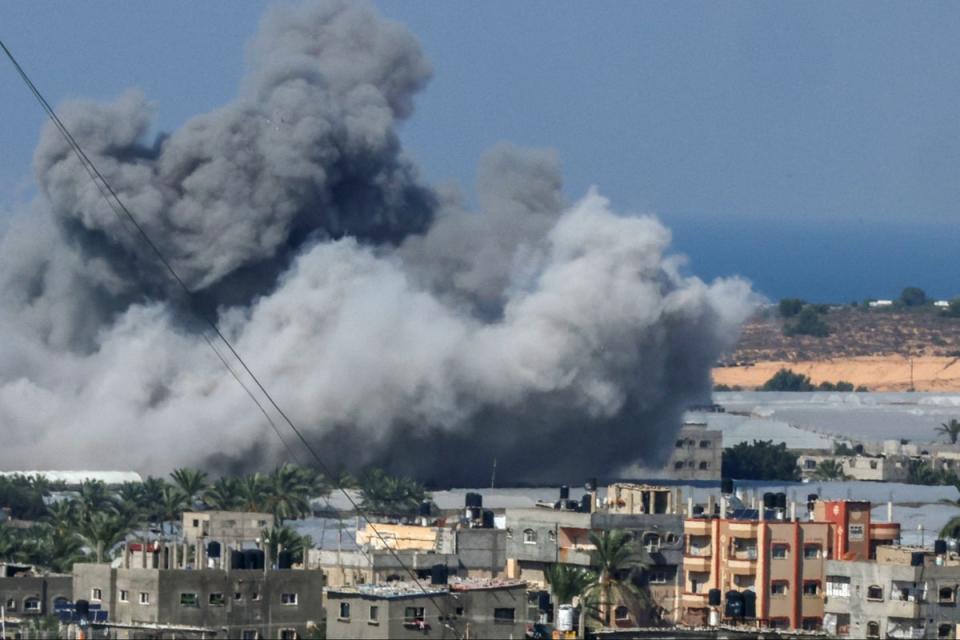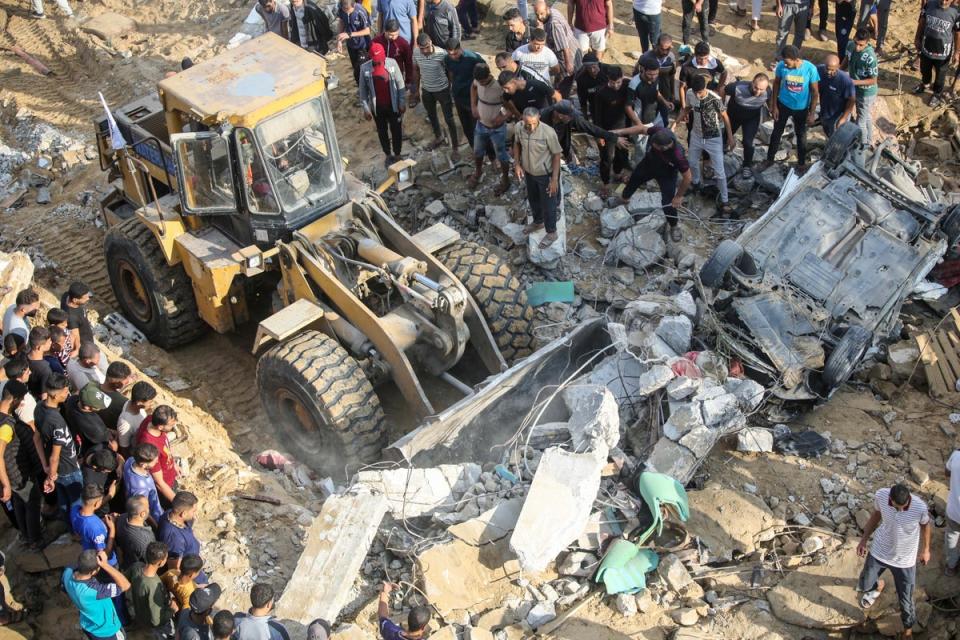People inside Gaza forced into drinking sea water as supplies run out – with enclave facing ‘real catastrophe’
- Oops!Something went wrong.Please try again later.
Civilians in Gaza have resorted to drinking sea water and dirty water as the supply of clean water has run out almost everywhere, with the World Health Organisation (WHO) saying the enclave is less than 24 hours from “real catastrophe”.
The UN’s Palestinian refugee agency told The Independent about the severe lack of fresh water, while medics say hospitals in Gaza have just hours left of generator fuel, while other critical supplies have either run out or will do so soon.
The UN and rights groups have pleaded for supply lifelines to be fully opened with Egypt, warning that Israel’s “total siege” of the enclave means that food, water and medical supplies are running perilously low. Since Gaza’s only power plant shut down five days ago, many fear that intensive care units will be plunged into darkness, with doctors having to switch off incubators and ventilators as their supply of diesel to power back-up generators runs out.
It comes as:
Thousands of Palestinians flee towards the southern border between Gaza and Egypt to escape an impending Israeli ground invasion in the north – while hundreds of foreign nationals also gather at the Rafah crossing
Rishi Sunak confirmed that six Britons had been killed and 10 were missing after the “pogrom” carried out by Hamas in Israel
Israel’s prime minister Benjamin Netanyahu vowed to do all he can to free hostages, as Israel said the number of those taken by Hamas is 199
Mr Netanyahu also warned Hezbollah and Iran not to “test” his nation with attacks on the northern border with Lebanon, amid fears that the conflict could spread to another front
US president Joe Biden said Israel “has to” go after Hamas, but it would be a “big mistake” for Gaza to be occupied by its forces

Despite the mounting humanitarian catastrophe and an impending Israeli ground invasion, Egypt said vital aid was stuck at its border, blaming Israel for “not cooperating”.
Egypt’s foreign minister, Sameh Shoukry, pointed the finger of blame at Israel, saying: “It has not taken a position to open the crossing from the Gaza side.” The Israeli government did not comment.
“It is critical that life-saving assistance is allowed to move through the Rafah crossing without delay,” UN humanitarian agency OCHA said in a statement, announcing that its chief, Martin Griffiths, would travel to Cairo on Tuesday.
In total, at least 2,808 Palestinians have been killed and 10,850 injured since Israel unleashed its heaviest ever bombardment of Gaza just under a week ago.
Included in that figure are more than 1,000 children, according to Defense for Children Palestine, an international monitoring group, who said that this means one child is killed approximately “every 15 minutes”.
The ferocious attacks are in response to the deadly attack carried out last week by Hamas militants, who crossed into southern Israel and killed more than 1,400 people, wounding thousands more and taking hostages.
The Israeli military has vowed an “unprecedented response to an unprecedented attack” by Hamas, admitting in a number of interviews with The Independent that these have been the most ferocious airstrikes ever recorded. They have also stated that a ground invasion is imminent.

In Gaza, the UN’s Palestinian refugee agency said the death toll from the onslaught was so high that Gaza was running out of body bags.
In the enclave’s largest city, meanwhile, doctors told The Independent that morgues were overflowing and bodies were being stacked against walls. They shared videos showing the authorities using bulldozers to hastily dig “emergency” mass graves in which to bury dozens of corpses. At the al-Aqsa Hospital in the centre of the country, medics described storing the excess bodies in refrigerated food trucks.
One young man, who asked not to be identified as he was evacuating south, said he had witnessed the authorities burying the dead “without family or friends present, as there was no time and no one left to bury them”.
“The problem is people are too afraid to go to cemeteries,” said Ghassan Abu Sitta, a prominent British-Palestinian surgeon who works for Doctors Without Borders at Gaza’s largest hospital, al-Shifa, which is also sheltering 35,000 people.
“Around 50 families have been completely wiped out because people are seeking refuge with their relatives” during the heavy deployment, he said. “And so there is no one left to bury anybody.”

Ahmed al-Mandhari, the WHO’s regional director for the eastern Mediterranean, told reporters that Gaza has around “24 hours of water, electricity and fuel left” and that the enclave is barrelling towards “real catastrophe”.
Israel has ordered Palestinian civilians to “evacuate” south ahead of an imminent ground offensive, an action that the UN and rights groups have warned could amount to the war crime of forcible transfer.
More than a million people are now displaced, with towns in the south now at more than double their capacity, while thousands have tried to head all the way to the border with Egypt.
In the Kuwait Hospital in the southern city of Rafah, chief doctor Suhaib al-Hams said he had had to order his staff to ignore orders from Israel to evacuate the facility, as they were over capacity and had nowhere to take the patients.
In total, 22 hospitals in Gaza have been instructed by Israeli military forces to evacuate, according to the WHO, which may amount to a violation of international law.
“The hospital is the largest one in the region, there are dozens of medical staff and patients. How can we move?” Dr Al-Hams asked, adding that he had spent eight straight days at the hospital. He could not even visit his three children who had been injured in a recent bombing attack, because there were so many wounded.
“Never before in my entire life have I witnessed anything like this, and I am unable to articulate what I have seen. I am left speechless.
“We have a continuous flow of patients. I beg the world, do not abandon us,” he implored.
Diplomatic efforts to enforce a ceasefire – to allow foreign citizens, including Britons and Americans, to leave, and to enable aid to be brought into Gaza – have failed.
Rear Admiral Daniel Hagari reiterated in a briefing that there was no Gaza ceasefire plan. “We are continuing our fight against Hamas, this murderous organisation that carried [the assaults on Israelis] out.”
Earlier on Monday, Egyptian security sources had announced an agreement to open the crossing to allow aid into the enclave. But Mr Netanyahu’s office later said: “There is currently no truce and humanitarian aid in Gaza in exchange for getting foreigners out.”

